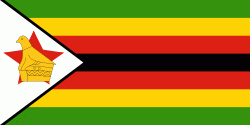Zvishavane (Zvishavane District)
Zvishavane (known until 1982 as Shabani ) is a mining town in Midlands Province, Zimbabwe. Surrounded by low hills, it lies 97 km west of Masvingo, on the main Bulawayo-Masvingo road. Other roads lead from Zvishavane to Gweru, 121 km north, and Mberengwa, 27 km south-west. It is also on direct rail links to Gweru and Beit Bridge which then link up with Harare and Bulawayo in Zimbabwe and to Maputo in Mozambique, and Pretoria in South Africa. It has a private airport serving the city.
Zvishavane was formerly called Shabanie (used by the mine) or Shabani (used for the town). The name "Shabanie" has been said to be derived from "shavani", a Ndebele word meaning "finger millet", or "trading together".
Zvishavane is a Shona name, which is said to be derived from "zvikomo zvishava", which means "red hills". The name means "reddish or 'reddened' hills", referring to the many surrounding low hills that are characterised by red soil.
Zvishavane derives its name from its sister town Mashava. Mashava is a ChiShona word describing the hills in that place as reddish. The name Mashava formerly Mashaba origins is stated in the Rhodesian Lore and Legend: SOUTHERN RHODESIA PLACE NAMES published by The Chief Information Officer, Information Services Branch. Division of Native Affairs, Salisbury September, 1960
Some claim that the name Shabanie derives from the isiNdebele Shavani which means "finger millet", or "trading together''. This is very unlikely for the matter that the English pronounced it as Shabanie.
However the isiNdebele syllable va rhymes with vha in ChiShona.
* "va" in ChiShona is pronounced as the isiNdebele "ba".
* The word baba in isiNdebele rhymes with Vava in ChiShona and they are pronounced the same.
* If Shavani was an isiNdebele word the ChiShona would have pronounced it as Shavhani. The English men would pronounce it as Sharvanie not Shabanie.
* If Shavani was a ChiShona word the isiNdebele would pronounce it Shabani, and so the English would pronounce it as Shabanie.
Zvishavane was formerly called Shabanie (used by the mine) or Shabani (used for the town). The name "Shabanie" has been said to be derived from "shavani", a Ndebele word meaning "finger millet", or "trading together".
Zvishavane is a Shona name, which is said to be derived from "zvikomo zvishava", which means "red hills". The name means "reddish or 'reddened' hills", referring to the many surrounding low hills that are characterised by red soil.
Zvishavane derives its name from its sister town Mashava. Mashava is a ChiShona word describing the hills in that place as reddish. The name Mashava formerly Mashaba origins is stated in the Rhodesian Lore and Legend: SOUTHERN RHODESIA PLACE NAMES published by The Chief Information Officer, Information Services Branch. Division of Native Affairs, Salisbury September, 1960
Some claim that the name Shabanie derives from the isiNdebele Shavani which means "finger millet", or "trading together''. This is very unlikely for the matter that the English pronounced it as Shabanie.
However the isiNdebele syllable va rhymes with vha in ChiShona.
* "va" in ChiShona is pronounced as the isiNdebele "ba".
* The word baba in isiNdebele rhymes with Vava in ChiShona and they are pronounced the same.
* If Shavani was an isiNdebele word the ChiShona would have pronounced it as Shavhani. The English men would pronounce it as Sharvanie not Shabanie.
* If Shavani was a ChiShona word the isiNdebele would pronounce it Shabani, and so the English would pronounce it as Shabanie.
Map - Zvishavane (Zvishavane District)
Map
Country - Zimbabwe
 |
 |
| Flag of Zimbabwe | |
The British South Africa Company of Cecil Rhodes demarcated the Rhodesia region in 1890 when they conquered Mashonaland and later in 1893 Matabeleland after a fierce resistance by Matabele people known as the First Matabele War. Company rule ended in 1923 with the establishment of Southern Rhodesia as a self-governing British colony. In 1965, the white minority government unilaterally declared independence as Rhodesia. The state endured international isolation and a 15-year guerrilla war with black nationalist forces; this culminated in a peace agreement that established universal enfranchisement and de jure sovereignty as Zimbabwe in April 1980. Zimbabwe then joined the Commonwealth of Nations, from which it was suspended in 2002 for breaches of international law by its government under Robert Mugabe and from which it withdrew in December 2003.
Currency / Language
| ISO | Currency | Symbol | Significant figures |
|---|---|---|---|
| ZWL | Zimbabwean dollar | 2 |
| ISO | Language |
|---|---|
| SN | Shona language |















